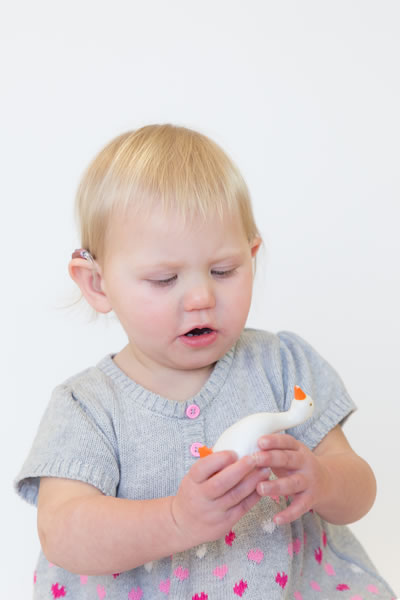Early Intervention
 Central Speech and Hearing Clinic provides early intervention services for children who are identified with a hearing loss and whose families wish to develop listening and spoken language for their child(ren). We see children from birth to adulthood and together with the family, we develop individualized goal plans that focus on supporting natural development of listening, understanding and use of spoken language, speech, cognition, literacy, and social communication following the Auditory-Verbal Approach.
Central Speech and Hearing Clinic provides early intervention services for children who are identified with a hearing loss and whose families wish to develop listening and spoken language for their child(ren). We see children from birth to adulthood and together with the family, we develop individualized goal plans that focus on supporting natural development of listening, understanding and use of spoken language, speech, cognition, literacy, and social communication following the Auditory-Verbal Approach.
The purpose of early intervention is to facilitate the development of age-appropriate spoken language skills and support families in understanding their child’s hearing loss and communication needs. At CSHC, families work closely with Listening and Spoken Language Specialists in learning how to become their child’s primary language model and in helping to integrate listening and spoken language into their home and other environments.
 Hearing is one of the most important factors in developing spoken language and literacy skills. In order to achieve the best possible spoken language outcome, consistent use of hearing aids and/or cochlear implants that provide appropriate access to all the sounds of speech needs to be provided as early as possible. Therapists and audiologists at CSHC work closely as a team to support continuous use and monitoring of equipment, access, and development of all milestones to facilitate appropriate expectations in listening and spoken language.
Hearing is one of the most important factors in developing spoken language and literacy skills. In order to achieve the best possible spoken language outcome, consistent use of hearing aids and/or cochlear implants that provide appropriate access to all the sounds of speech needs to be provided as early as possible. Therapists and audiologists at CSHC work closely as a team to support continuous use and monitoring of equipment, access, and development of all milestones to facilitate appropriate expectations in listening and spoken language.
CSHC provides the following services as part of the early intervention program:
- Individualized therapy tailored to each child and family’s specific and unique needs
- Support, guidance and coaching for families in integrating listening and spoken language at home
- Continuous assessment and monitoring of appropriate hearing technology
- Continuous assessment and monitoring of the child’s auditory, speech, spoken language, literacy, and social communication skills
- Continuous support, guidance, and coaching for other professionals involved with the child’s care and education, including other caregivers, speech-language pathologists, inclusion workers, educational assistants, and teachers
- Opportunities for families to connect and support each other
Dr. Carol Flexer published an article in Sound Matters on the importance of auditory brain development.